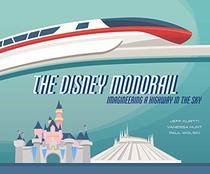Search -
The Disney Monorail: Imagineering the Highway in the Sky (Disney Editions Deluxe)
The Disney Monorail Imagineering the Highway in the Sky - Disney Editions Deluxe
Author:
On June 14, 1959, Walt Disney s Monorail opened at Tomorrowland in Disneyland and became the first daily operating monorail in the Western Hemisphere. Tomorrow offers new frontiers in science, adventure, and ideals: the Atomic Age . . . the challenge of outer space . . . and the hope for a peaceful and unified world, Walt Disney had said of his ... more »
Author:
On June 14, 1959, Walt Disney s Monorail opened at Tomorrowland in Disneyland and became the first daily operating monorail in the Western Hemisphere. Tomorrow offers new frontiers in science, adventure, and ideals: the Atomic Age . . . the challenge of outer space . . . and the hope for a peaceful and unified world, Walt Disney had said of his ... more »
ISBN-13: 9781484737675
ISBN-10: 1484737679
Publication Date: 10/22/2019
Pages: 224
Rating: ?
ISBN-10: 1484737679
Publication Date: 10/22/2019
Pages: 224
Rating: ?
0 stars, based on 0 rating
Genres:
- Arts & Photography >> History & Criticism >> Themes >> Science Fiction & Fantasy
- Travel >> Reference >> Tourist Destinations & Museums
- Travel >> Specialty Travel >> Theme Parks
- Humor & Entertainment >> Pop Culture >> Art




